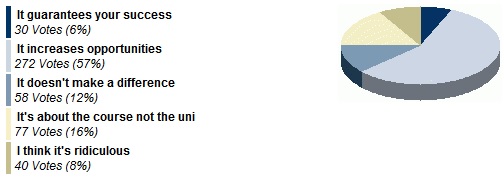You are going to university to get a degree, and this degree is your golden ticket to getting a job. But when you finish university and find yourself competing against hundreds of job seeking graduates, what is going to make YOU the candidate that employers want? Parents and grandparents would confidently say that depending on how highly ranked your university is, this would determine your success in life and get you the career you want. But is this still the case for our generation?
is it unfair to state that university ranking will determine your success, and is it still considered to be as much of a prominent influence as it was 20 years ago?
I remember discussing my university choices with older relatives of mine when I was in the process of applying, and they told me I was silly to even consider choosing universities that aren't in the Russell Group, as "employers will not take you seriously." I agree, university ranking is a contributing factor to your job prospects - on paper, the Durham graduate compared to the London Metropolitan graduate may have more chance at getting the job, because of Durham's academic excellence and rank in the league table. However, is it unfair to state that university ranking will determine your success, and is it still considered to be as much of a prominent influence as it was 20 years ago? We conducted our own survey at GRB to ask graduates and students on their thoughts and asked them, "Does University ranking even matter in 2013?"

57% of our students voted that university ranking increases opportunities. This does tend to be the case, as these graduates have the advantage of the university's good reputation behind them when they apply for jobs. University ranking is also a way for employers to narrow down their choice of job applicants, as is assures them they have the highest calibre of graduates to choose from.
Coming in at our second highest result, 16% of our students stated that it's the course that matters, not the university. In some cases, employers in the media industry prefer students who have media qualifications. A Media graduate will have learnt essential skills such as being able to calculate stats and conduct reports, something that perhaps an English graduate may not know about or have much experience in. According to The Guardian University Guide 2014, Bournemouth University is ranked as 59th in the UK, however the Media School at Bournemouth University is world renowned for being one of the largest media schools and having an outstanding reputation for its teaching and research. So although the university overall is not ranked as high as others, its media school is one of the best in the world - think of it as the Cambridge of the media schools perhaps. This means that media graduates from Bournemouth have an exceedingly strong chance in impressing employers within the media industry, so much so that they will potentially have a stronger chance than those from higher ranked universities.
"I currently study at the University of Sussex, which is known to be a good university. I applied when it was ranked as 9th in the UK, and began my time there when it was 11th. However, I was recently shocked to see it was ranked as 50th in the latest Guardian league table."
It would be entirely unfair to state that university ranking determines success nowadays, as there are so many factors that come into the selection process of employing graduates. Our graduates and students agreed, as only 6% of them voted university ranking as a guarantee for success. University rankings give a good indication of how academic a university is, but it is not the determining factor for success. I currently study at the University of Sussex, which is known to be a good university. I applied when it was ranked as 9th in the UK, and began my time there when it was 11th. However, I was recently shocked to see it was ranked as 50th in the latest Guardian league table. This is a staggeringly low plummet for Sussex, but does this mean that my job opportunities will completely diminish? I won't know until I graduate, but Sussex is a reputable university and known for its leading levels of academia and research achievements. I am hesitant to believe that I will have low chances of career success, because of a recent drop in a university league table.
And it's not just university ranking that employers look at now, it's everything you have done with your time whilst being at university. A degree from a well ranked university was an exceptionally prominent factor for employers when considering graduates 20 years ago, but because it is so competitive nowadays, employers want to see more - have you had work experience? Are you an active member in your university societies? Have you fundraised for your local charity? All of these things will make you stand out, and will surely impress employers.
So does university ranking matter? The ranking of your university can propel your chances of employability, but remember it is not the only factor in determining your success. A degree is pretty much the necessity nowadays, but taking on work experience and padding out your CV as much as possible is what will make the difference.
 57% of our students voted that university ranking increases opportunities. This does tend to be the case, as these graduates have the advantage of the university's good reputation behind them when they apply for jobs. University ranking is also a way for employers to narrow down their choice of job applicants, as is assures them they have the highest calibre of graduates to choose from.
Coming in at our second highest result, 16% of our students stated that it's the course that matters, not the university. In some cases, employers in the media industry prefer students who have media qualifications. A Media graduate will have learnt essential skills such as being able to calculate stats and conduct reports, something that perhaps an English graduate may not know about or have much experience in. According to The Guardian University Guide 2014, Bournemouth University is ranked as 59th in the UK, however the Media School at Bournemouth University is world renowned for being one of the largest media schools and having an outstanding reputation for its teaching and research. So although the university overall is not ranked as high as others, its media school is one of the best in the world - think of it as the Cambridge of the media schools perhaps. This means that media graduates from Bournemouth have an exceedingly strong chance in impressing employers within the media industry, so much so that they will potentially have a stronger chance than those from higher ranked universities.
57% of our students voted that university ranking increases opportunities. This does tend to be the case, as these graduates have the advantage of the university's good reputation behind them when they apply for jobs. University ranking is also a way for employers to narrow down their choice of job applicants, as is assures them they have the highest calibre of graduates to choose from.
Coming in at our second highest result, 16% of our students stated that it's the course that matters, not the university. In some cases, employers in the media industry prefer students who have media qualifications. A Media graduate will have learnt essential skills such as being able to calculate stats and conduct reports, something that perhaps an English graduate may not know about or have much experience in. According to The Guardian University Guide 2014, Bournemouth University is ranked as 59th in the UK, however the Media School at Bournemouth University is world renowned for being one of the largest media schools and having an outstanding reputation for its teaching and research. So although the university overall is not ranked as high as others, its media school is one of the best in the world - think of it as the Cambridge of the media schools perhaps. This means that media graduates from Bournemouth have an exceedingly strong chance in impressing employers within the media industry, so much so that they will potentially have a stronger chance than those from higher ranked universities.




